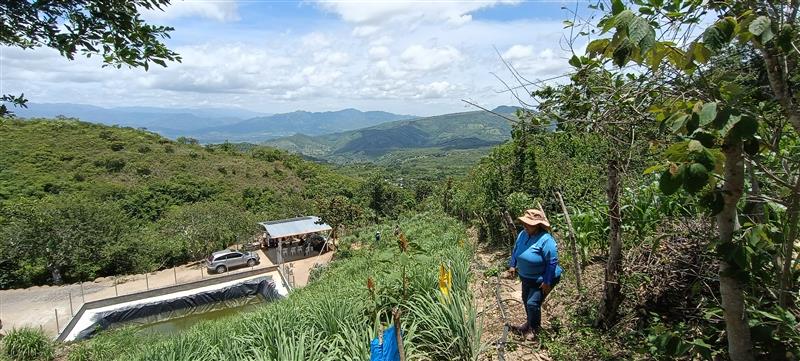
San José, Costa Rica, 6 December 2024 (IICA). At an event held to present the results of the Rural Energy project, the partners involved described how more than 3000 rural producers in Bolivia, Colombia, Costa Rica and Guatemala are transforming their agricultural production by using low-cost technologies that allow them to make efficient use of renewable energy sources in their communities.
The purpose of Rural Energy, promoted by the Inter-American Institute for Cooperation on Agriculture (IICA) and the Biomatec Foundation, with financial assistance from the Spanish Agency for International Development Cooperation (AECID), is to create clean and renewable energy projects designed to increase productivity by making agricultural operations more efficient.
Through the teams set up in each of the countries participating in the initiative, 45 projects were implemented that have strengthened 28 community-based organizations and benefited more than 3000 people in rural areas, 56% of whom are women.
The projects mainly focused on the use of solar photovoltaic energy. The energy produced by solar panels is being used for lighting and heating, and to pump drinking water, dry cereals, and operate grain mills, aerators, pulpers and cooling systems.
During the event, IICA Director General Manuel Otero acknowledged the disparity between urban and rural areas in terms of opportunities and quality of life. However, he stressed that projects such as Rural Energy are essential to bridge that gap by improving energy efficiency and quality of life in rural areas.
“I would like to highlight the importance of rural areas in the development of the region’s economies and their potential for innovation in the generation of energy,” Otero concluded.
María Febres, IICA Representative in Costa Rica, underscored the importance of the participation of a variety of actors, including producer organizations that committed to the project, and emphasized that true development is driven by local communities.
Febres said she was delighted to see the improvements in the quality of life of the project participants, adding that the positive results would make it possible to present new proposals and leverage additional resources. She mentioned the opportunities that were emerging in Guatemala, Bolivia, Colombia and Costa Rica, and suggested that what had been achieved could inspire similar projects in other countries.
Other participants in the event included Rafael García, General Coordinator of Spanish Development Cooperation in Costa Rica; Cindy Torres, President of the Biomatec Foundation; and Kenneth Solano, IICA Specialist in Project and Agribusiness Management and the head of the project.
Rafael García stressed the importance of international cooperation and the challenges faced by development projects, and expressed satisfaction with the results achieved by the Rural Energy project, which had worked at the grassroots level, taking advantage of local initiatives and using high-level technological and institutional partners.
Torres highlighted the impact of the project in addressing social and anthropological challenges, serving vulnerable populations, and presenting successful cases that made it possible to transfer and project tangible solutions. She emphasized the importance of multilateral cooperation for the growth of the Latin American region, and her conviction that sustainable solutions could be achieved.
She also underlined the importance of purposeful social action and the formulation of policies and technical regulations that facilitate sustainable development. She stressed that the project was a living example of collaboration and expertise, and expressed appreciation for the opportunity to work together and share values and mission.
Kenneth Solano suggested that the results and the impact achieved in rural communities were the spark that should light an even bigger flame. “We have shown that it is possible to implement actions in rural areas successfully, and that the cost-benefit ratio at the environmental, productive, economic and social levels is very positive,” he added.
“Everyone involved in the project is committed to disseminating and sharing these results, in hopes of being able to replicate this model in more communities, organizations and countries across Latin America and the Caribbean, where we know that the needs are similar and the impact can be even greater,” Solano concluded.

The energy produced by solar panels is being used for lighting and heating, and to pump drinking water, dry cereals, and operate grain mills, aerators, pulpers and cooling systems.
Protagonists of change
Orlando Morichi, leader of the Buena Vista Fish Farmers Association in the community of Buena Vista, District of Sapecho, Municipality of Palos Blancos, in Bolivia, is one of the beneficiaries of the project.
The implementation of solar photovoltaic-powered electric aerator systems has produced great benefits for the community and the association. Use of the aerators has increased production significantly, and improved product quality and the project’s rate of return, which in turn has made it possible to use the funds for the growth of the organization.
In Costa Rica, Juliana Espinoza and the Association of Agro-Environmental Cocoa Producers of Guatuso (ASOPAC) have also played a leading role in the Rural Energy project. The use of cocoa dryers powered by energy from solar panels has enabled them to reduce and improve drying times, and obtain cocoa seeds with greater value added.
The Rural Energy project is a successful model of sustainable development, equipping rural communities with the tools they need to improve their quality of life and productivity through the use of clean energy.
More information:
Institutional Communication Division.
comunicacion.institucional@iica.int











